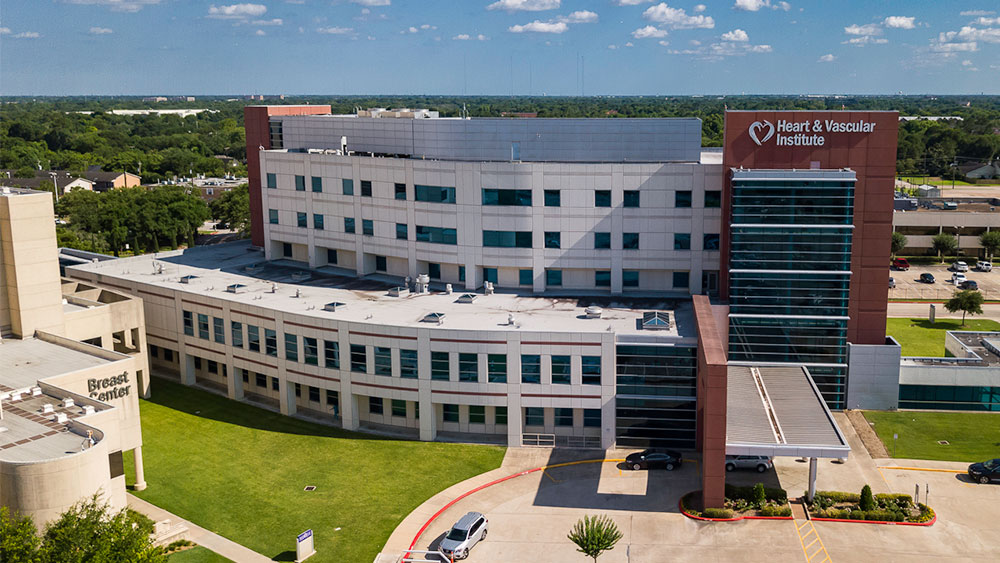At Memorial Hermann Health System, we are dedicated to providing patient-centered, comprehensive cardiovascular care. Our highly trained specialists diagnose, treat, and manage a wide range of heart and vascular conditions to deliver the best possible outcomes and patient experiences.
Advanced stenting techniques help millions of people each year by keeping coronary arteries open to maintain sufficient blood flow and improve symptoms like chest pain and shortness of breath. For patients with heart disease who may have partially clogged arteries, cardiovascular stents can be lifesaving.
If you have heart disease, your physician can evaluate your condition to determine if cardiovascular stents may be an appropriate treatment to help prevent a heart attack.
What Is a Stent?
A heart stent is a tiny device made of expandable wire-mesh tubing that is permanently inserted into a coronary artery to keep it open. Stents have been used for many years, and the technology has greatly improved during that time. The mesh stents that are used today are made of a flexible material and result in fewer complications than previous versions.
Stents are inserted during an angioplasty procedure. Angioplasty opens clogged or narrowed arteries, and stents support the newly opened arteries and keep them open. This helps to reduce the risk of a heart attack.
There are two types of stents:
Drug-Eluting Stents
These devices are coated with medication and are the most common type of cardiovascular stent. The medication is slowly released to help prevent scar tissue from forming, which makes it less likely for the artery to narrow again.
Bare Metal Stents
These devices do not contain medication. They act as structural support to hold the arteries open, and are often the preferred choice for patients who have a higher bleeding risk.
How Does a Stent Work?
As part of an angioplasty procedure, the stent is inserted into the clogged or narrowed artery while attached to a balloon catheter. Next, the balloon is inflated which opens the artery and expands the stent. Once in place, the stent remains in the artery permanently to keep it open so that blood can flow freely. Improved blood flow can help relieve symptoms of heart disease like shortness of breath and chest discomfort.
Who Can Benefit From a Stent?
Patients with heart disease and/or narrowed, blocked, or clogged coronary arteries may benefit from a stent to help reduce symptoms or to prevent a heart attack. Reduced blood flow to the heart muscle can result in chest pain or shortness of breath. If a clot forms and completely blocks the blood flow, the result is a heart attack.
Stents may be the appropriate treatment, depending on where the blockage is located and the size of the artery. If a blockage is suspected, your physician will perform a physical examination and may order additional testing including an electrocardiogram, treadmill stress test, or other more advanced imaging tests.
Signs of a blockage may appear mild at first, but should never be ignored. If you are experiencing any of the following symptoms after minor physical activity, you should seek medical care:
- Chest discomfort, tightness or pain
- Shortness of breath or feeling lightheaded
- Feeling weak
- Reduced endurance
What to Expect During the Procedure
Heart stents are inserted during an angioplasty procedure. This procedure is performed by a cardiologist with a team of specialized cardiac nurses and other technicians. Most patients do not require general anesthesia, and remain awake (although possibly sedated) during the whole process.
Local anesthesia is used to prepare an area in the groin or wrist. The physician will make a small incision to insert a balloon catheter into a blood vessel. Using X-ray technology and contrast dye, the catheter is guided through the blood vessel to the artery until it reaches the location of the blockage or narrowing. Once the catheter is in place, the balloon is inflated to widen the blocked artery and position the stent.
Risks and Side Effects
Inserting stents during an angioplasty is a less invasive way to expand narrowed or clogged arteries than traditional bypass surgery, but there are still risks involved. Some of the possible side effects include:
- Bleeding, bruising or infection at the site where the catheter was inserted
- Blood clots
- Re-narrowing of the artery
- Rupture of the coronary artery
- Abnormal heart rhythms
- Chest pain or discomfort
- Allergic reaction to contrast dye
- Kidney damage from contrast dye
- Heart attack
- Stroke
After the Procedure
Some patients are able to go home the same day the stents are inserted. Others may need to stay in the hospital overnight for heart monitoring. You may have pain or bruising at the incision site, but most people are able to return to work about a week after having a stent inserted. Talk with your physician about when it is safe to resume normal activities.
Coronary heart stenting improves quality of life for many patients. Because the procedure increases blood flow through your coronary artery, you should feel a noticeable difference in symptoms like chest pain or shortness of breath, and you should be able to better tolerate exercise. It is important to remember that the procedure does not cure heart disease. You will need to practice healthy lifestyle habits and take the medications prescribed by your doctor.
Most patients will need to take antiplatelet medications to prevent blood clots from forming and causing a repeat blockage. Your physician may recommend taking both aspirin and an additional antiplatelet medication, which is known as dual antiplatelet therapy. You will likely need to take aspirin indefinitely.
Scheduling an Appointment
Heart and vascular specialists affiliated with Memorial Hermann are committed to using a multidisciplinary approach to provide exceptional care. Our highly skilled practitioners utilize leading-edge technology to diagnose and treat cardiovascular concerns.
To learn more about cardiovascular disease and advanced heart stenting, visit Find a Doctor to schedule an appointment.
Contact Us
Please fill out the fields below and we will contact you, or call (713) 222-2273 for more information.
Healthy Living
A healthy heart begins with healthy habits. Create balance and take charge of your heart health today.
Nutrition
Eat smarter with heart healthy eating tips and recipes. Learn to cut sugars, eat clean and more.
Fitness
Get moving with this guide to heart healthy fitness! Learn how exercise improves your heart health.




